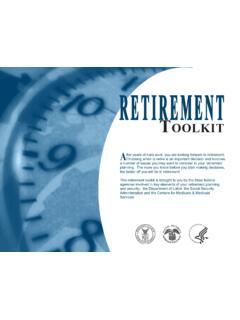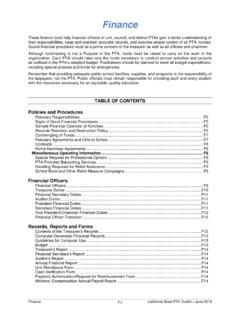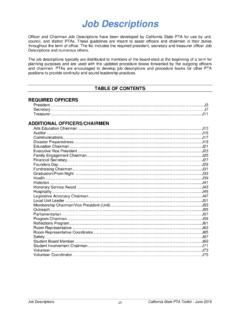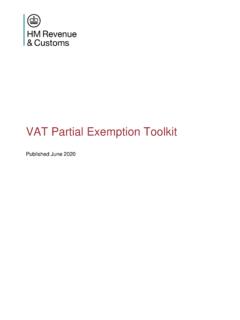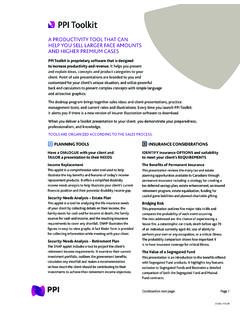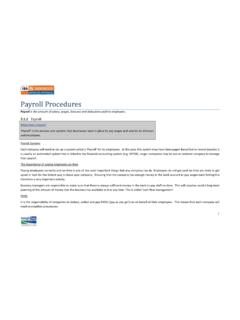Transcription of How to Start a 501(c)(3) Nonprofit Organization in North ...
1 How to Start a 501(c)(3) Nonprofit Organization in North CarolinaInformation Packet We recommend that you seriously consider whether to create a new Nonprofit Organization . The laws and regulations that tax-exempt nonprofits must follow are complex and time consuming. Finding and maintaining funds from a wide range of supporters is difficult. Identifying and engaging strong board members takes time and attention. Page 2 of this document offers ideas for accomplishing your goals without starting a new Nonprofit . The North Carolina Center for Nonprofits has compiled these resources as a service to you. The Center does not provide consulting services or assistance with filing documents for incorporation or tax-exempt status. We recommend that you consult an attorney to help with the legal process of forming a tax-exempt Nonprofit You can become a Member of the Center to get access to many services for governing and managing your Organization , sustaining it over time, increasing its impact, and saving time and money.
2 These include sample bylaws, samples of important policies for board governance, and a checklist to help you comply with Nonprofit laws and regulations. For information on all the benefits of Center membership and to join, visit Membership is open to all 501(c)(3) nonprofits operating in North Carolina, groups applying for this status, and other community groups that work for the public benefit and have chosen not to apply for tax exemption. Alternatives to Starting a Nonprofit Establishing a new Nonprofit corporation and maintaining the required administrative, regulatory, legal, and financial support can be very difficult. Funding a Nonprofit on a long-term basis is also a big challenge, especially with funders' growing concern about duplication. Before you decide to create a new, separate Nonprofit , we suggest that you talk with existing nonprofits that have goals similar to yours. Consider creating a project or program within another Organization rather than spending your time and energy to establish a whole new entity.
3 Funders are reluctant to invest in new organizations without a track record, especially during challenging economic times, and it behooves all parties to work within existing structures. Many nonprofits begin and end without ever achieving their vision. Can you achieve yours without starting a new Organization ? 1. Become a volunteer, board member, or even a staff member with a Nonprofit already active in your area. 2. Identify three nonprofits most compatible with your ideas. Explore creating a special project or initiative, and negotiate how you can be involved. 3. Look at national organizations working in your area of interest and Start a local chapter. 4. If your effort will be quite local and small, form an unincorporated association or club. Have meetings and activities, but skip the reporting requirements if your annual budget stays under $25,000. 5. If you want to finance scholarships, family emergency funds, or others' activities and needs, establish a fund at a community foundation or Organization .
4 Jon Pratt Jon Pratt is executive director of the Minnesota Council of Nonprofits. Reprinted with permission. Creating a 501(c)(3) Nonprofit in North Carolina Initial Planning Is your Nonprofit needed? Carefully assess the need for your proposed Nonprofit Organization . Before you decide tocreate a new, separate Nonprofit , talk with existing nonprofits that have goals similar to yours. Consider creating aproject or program within another Organization rather than spending your time and energy establishing a new Organization . Establish a Board of Directors. If you are sure a new Organization is really needed, the next step is to establish a Boardof Directors. North Carolina law requires only one board member, but best practices recommend that you have nofewer than five; seven or more are preferable. As you recruit board members, make sure they are aware of their roles and responsibilities. These include but are not limited to: selecting and reviewing the performance of the chief executive; recruiting new boardmembers; ensuring effective organizational planning; evaluating organizational performance; providingfinancial oversight; and ensuring legal and ethical integrity.
5 A first priority for the board is to clarify the Organization s mission and purpose. The board must determine both its short-and long-term goals by identifying who the Organization will serve, clarifying what values willdrive Organization , d planning for how the Organization s mission may evolve. Steps to Establish Your Nonprofit Incorporate by filing articles of incorporation with the Department of the Secretary of State. For forms and freeinformation, including guidelines for incorporating: 1-888-246-7636 or 919-807-2225 or Before applying for tax-exempt status, you need to create organizational bylaws. It s helpful to review those ofexisting nonprofits and to have a lawyer review them before they re finalized. You ll need to have an initial meeting ofthe board of directors to adopt the bylaws. Apply for a Federal Employer Identification Number (EIN) even if your Nonprofit doesn t have employees. This EIN isused by the IRS to track reports and your Form 1023 tax-exempt application (see below).
6 To apply, submit IRS FormSS-4 either online, by phone, by mail, or by fax. Call the IRS s Business & Specialty Tax Line (1-800-829-4933) or ,,id=97860, Next, apply for tax-exempt status as a 501(c)(3) Nonprofit . The Form 1023 and instructions are available We strongly recommend you have an attorney and an accountant/CPA familiar withnonprofit tax law review your application before final submission. You should hear back from the IRS in 3-24 months. If your Organization has annual gross receipts of $50,000 or less and total assets of $250,000 or less, you may be ableto file the 1023-EZ. After receiving tax-exempt status, apply to the Department of Revenue for exemption from state corporateincome tax and franchise tax. If your Organization will have paid employees, get a State Withholding IdentificationNumber (you must begin withholding taxes as soon as you begin paying employees). Contact the Department ofRevenue at 1-877-252-3052. You are required to carry workers compensation insurance once you have three full -or part-time employees and/orcorporate officers (including uncompensated board officers).
7 Contact the North Carolina Industrial Commission (1-800-688-8349, ) for information on how to obtain coverage. 2015 North Carolina Center for Nonprofits Continued on next page File with the Employment Security Commission (919-707-1150, ) for unemployment taxes when you have at least four full-or part-time employees working a total of 20 weeks in one calendar year . Apply for an Unemployment Tax Number and then file the Employer s Quarterly Tax and Wage Report. 501(c)(3) nonprofits may elect to reimburse for unemployment claims rather than pay unemployment taxes. Apply for local property tax exemption by contacting your local County Tax Office. Even if property tax exemption is granted, it is still necessary to file a complete property listing by January 31. Finally, make sure you apply for a Charitable Solicitation License through the Solicitation Licensing Branch of the Department of the Secretary of State (1-888-830-4989 or 919-807-2214, ) if you will be raising $25,000 or more in one calendar year .
8 If you receive less than that amount, you still need to apply to become exempt from requiring the license. Every Nonprofit must contact the Secretary of State each year . Ongoing Legal Requirements Report to the IRS. Nonprofits with annual gross receipts of $50,000 or less must file an e-Postcard annually. If your annual budget is less than $5,000 and you ve never applied for 501(c)(3) tax-exempt status, you still need to file (you won t be penalized for filing late). Call IRS Customer Account Services, 1-877-829-5500. Nonprofits with annual gross receipts of more than $50,000 or with an average of more than $50,000 over the past three years must file a Form 990 or 990-EZ annually within 5 months after your fiscal year ends. All supporting or controlling organizations must file Form 990 or 990-EZ. Nonprofits with annual gross receipts under $200,000 and total assets under $500,000 can file form 990-EZ. Private foundations must file a 990-PF. Churches, their integrated auxiliaries, and conventions or associations of churches don t need to file.
9 These forms are available on the IRS website, and Nonprofits that fail to file their e-Postcard, 990, or 990-EZ for three consecutive years will automatically lose their tax-exempt status. Call 1-877-829-5500 or your CPA for details. Renew your Organization s Charitable Solicitation License and tax-exempt status. The license must be renewed annually, within months after the end of your fiscal year . If you are exempt from having the license, you generally still need to contact the Secretary of State each year . Collect sales tax on items sold. If your Nonprofit sells retail items, register with the Department of Revenue for a Certificate of Registration, file Form E-500, and pay the tax due on a quarterly or monthly basis, depending on your volume of sales. Contact the Taxpayer Assistance Division, 1-877-252-3052 or Your Nonprofit may be eligible for semi-annual refunds of sales taxes paid. When needed, update your principal office address and registered agent with the Secretary of State.
10 For a Change of Registered Office/Agent form, call the Department of the Secretary of State (919-807-2225, ). Follow all state and federal laws related to employment, including I-9, W-2, and W-4 forms; withholding taxes; and posting all compliance posters. For free compliance posters, call the Department of Labor, 866-4-USADOL and the Department of Labor, 1-800-NC-LABOR. You can download posters at 2015 North Carolina Center for Nonprofits Continued on next page Resources How to Form a Nonprofit Corporation, Anthony Mancuso (Nolo Press, ). The Nonprofit Handbook, Gary Grobman (White Hat Communications, 717-238-3787, ). Chapter 55A North Carolina Corporation Act:c Principles & Practices for Nonprofit Excellence: A Self-Help Tool for Nonprofit Organizational Effectiveness ( ), published by the North Carolina Center for Nonprofits. Provides specific benchmarks of best practices around planning, governance, human resources, financial management, fundraising, information and technology, evaluation, strategic alliances, civic engagement and public policy, and transparency and accountability.

